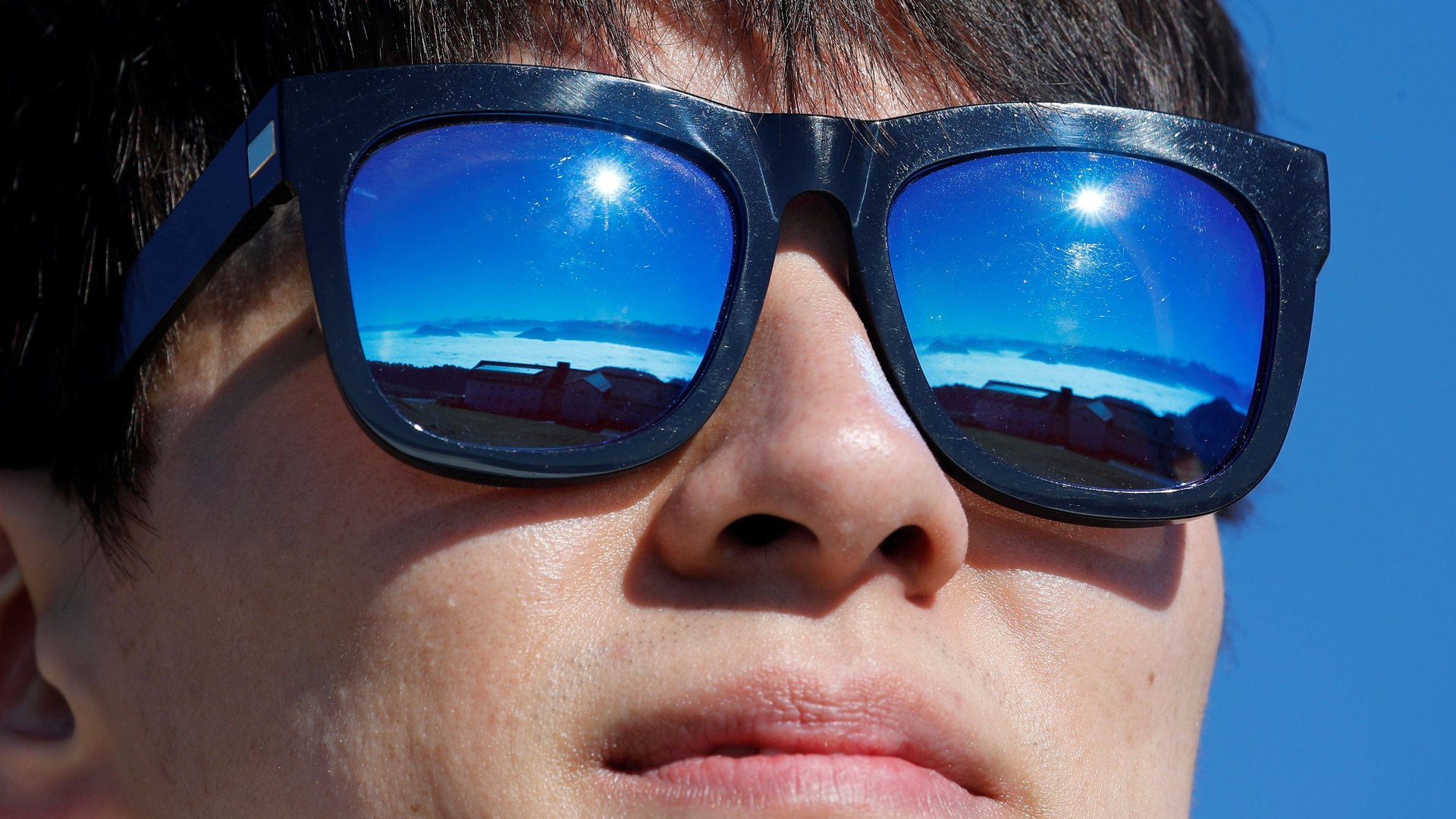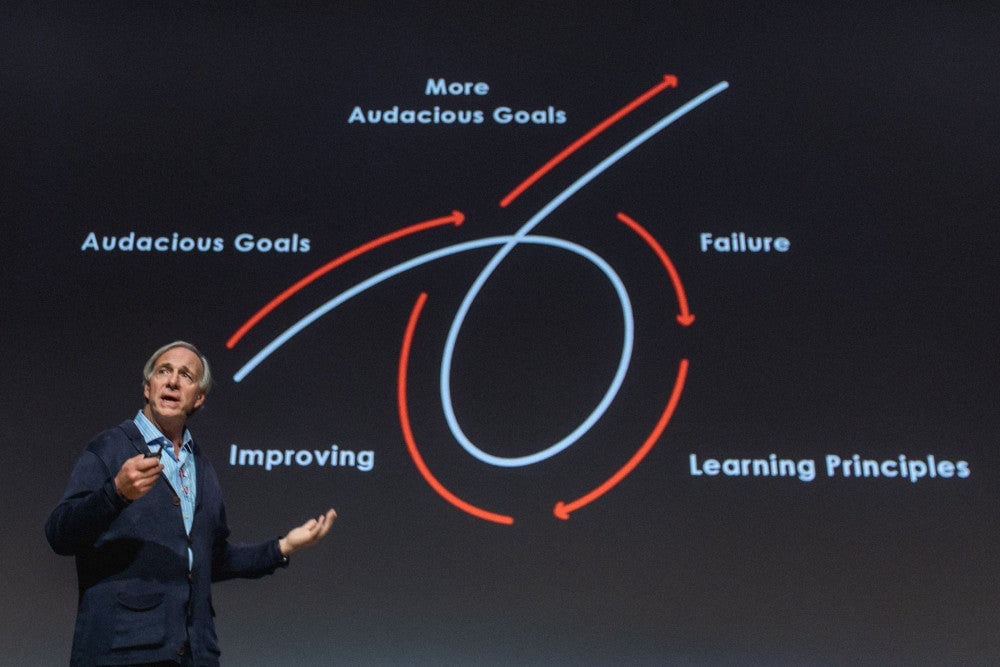The key to effective goal-setting is a little theory called “Pain + Reflection”
Prior to becoming a journalist, I spent a year working at Bridgwater Associates, the world’s largest hedge fund. Bridgewater is infamous for its culture of “radical transparency,” in which everyone, even the most junior employees, can openly critique their bosses, peers, or underlings.


Prior to becoming a journalist, I spent a year working at Bridgwater Associates, the world’s largest hedge fund. Bridgewater is infamous for its culture of “radical transparency,” in which everyone, even the most junior employees, can openly critique their bosses, peers, or underlings.
During this fulfilling and insane year, everyone around me repeated one phrase: “Pain plus reflection equals progress.” They said it during interpersonal conflicts, when someone would start to cry. They said it during team celebrations, when major goals were hit. And most often, they wrote it via email, after particularly biting criticisms, of which there were many.
Once, when a friend called me asking for dating advice, I immediately responded, “Pain plus reflection equals progress,” to which she hung up.
Dalio’s fundamental theorem
“Pain plus reflection equals progress” is a cornerstone of the philosophy of Ray Dalio, the founder of Bridgewater and author of Principles, a business best-seller that lays out the 210 precepts underlying Bridgewater’s culture.
Much has been written about Dalio’s Principles since he published the manifesto in 2017. Essentially, the principles boil down to this: Success and growth are only possible if you pursue truth at all costs, by being genuinely curious, instead of defensive, about your strengths and weaknesses. Such vulnerability enables you to see your character, work, and relationships from a higher, objective lens. And only when you view yourself objectively, disconnecting from your ego, can you make truly logical decisions.
This sounds fine and good, except one hitch: Besides Bridgewater, few workplaces facilitate, or encourage brute honesty. In fact, many workplaces punish it.
But that doesn’t mean you can’t experience life-altering objectivity, vulnerability, and truth-seeking on your own, without alienating everyone you know. According to Dalio, the key is effective goal setting and goal iteration, which you can make happen by embracing the idea that … pain plus reflection equals progress.
Developing your principles
At the recent Summit LA18 ideas conference in Los Angeles, Dalio showed a slide to explain the goal-setting powers of his equation.

“I would go after audacious goals, and then I would succeed and fail,” he told the audience. And he found that the failures, and the challenges he encountered on his way to his successes, came with great benefits. “How you’re dealing with those problems is one of the most important things,” he said. “I started to realize… that pain plus reflection equals progress.” He continued:
“In other words, that painful situation, if you can diagnose what produced that failure, and then develop principles for dealing with it different at a different time, in a different way, and then you take those principles and you improve, you learn, you change things, then you improve and you … go on to more audacious goals. The way I look at life is pretty much like it’s this looping process, this evolutionary looping process. That means you go after your audacious goals, you fail, you learn. Failure is an important part of that process. You learn principles. You keep improving.”
“Principles are,” he said, “essentially recipes for dealing with situations that happen over and over again.” They often result from the lessons you learn as you set goals, try to achieve them, and then reflect on the experience. Whether you’re successful or not, your personal principles will crystalize, teaching you what to do in the future.
The key is being open to learning these personal principles, by embracing both the pain of failure itself, and the difficulty of reflecting on failure, without becoming defensive or egotistical. If you cannot honestly, non-judgmentally reflect on your successes and failures, you will repeat mistakes instead of setting the right goals in the future.
Don’t forget the micro-decisions, and other important reminders in Principles
Confronting failure is important. But according to Dalio, dissecting the individual decisions that help you set, accomplish, or fall short of your goals is the most essential element of the “pain plus reflection equals progress” equation. He explains his reasoning in the employee edition of Principles:
“As we head toward our goals we encounter an enormous number of choices that come at us, and each decision we make has consequences. So, the quality of our lives depends on the quality of the decisions we make. We literally make millions of decisions that add up to the consequences that are our lives.”
He clarifies that choosing well is not dependent on innate intelligence or creativity, but rather on character—meaning that anyone is capable of making smart decisions. From the employee edition of Principles:
“It is a fundamental law of nature that to evolve one has to push one’s limits, which is painful, in order to gain strength. Nature gives us pain as a messaging device to tell us that we are approaching, or that we have exceeded, our limits in some way. At the same time, nature made the process of getting stronger require us to push our limits. Gaining strength is the adaptation process of the body and the mind to encountering one’s limits, which is painful. In other words, both pain and strength typically result from encountering one’s barriers. When we encounter pain, we are at an important juncture in our decision-making process.”
Most people react poorly to pain by having a fight or flight reaction, says Dalio. This paralyzes them from finding ways around barriers, leading them to repeat their mistakes. But those who react well to the pain of confronting a failure tend to get stronger.
“This is because most learning comes from making mistakes, reflecting on the causes of the mistakes, and learning what to do differently in the future. Believe it or not, you are lucky to feel the pain if you approach it correctly, because it will signal that you need to find solutions and to progress. Since the only way you are going to find solutions to painful problems is thinking deeply about them—i.e., reflecting—if you can develop a knee-jerk reaction to pain that is to reflect rather than to fight or flee, it will lead to your rapid learning [and] evolving.”
Pain plus reflection equals progress. It’s an equation that will forever be stuck in my head. I consider that a blessing.